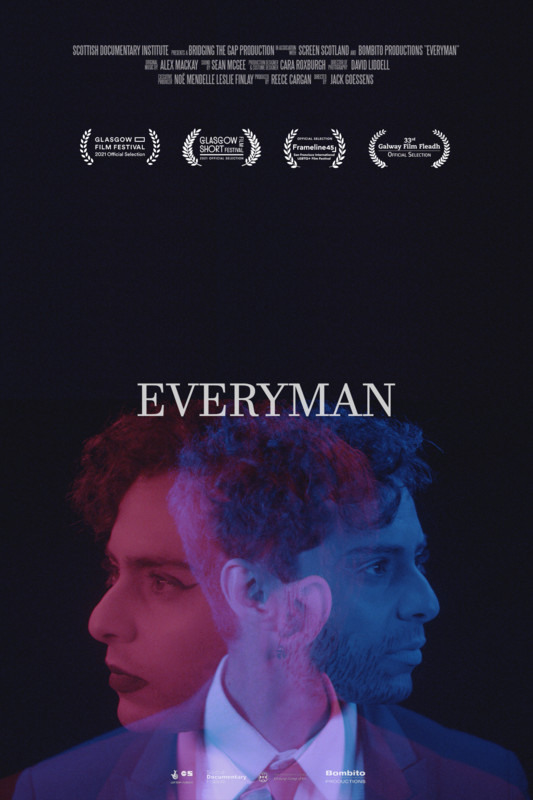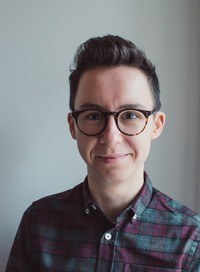
Case Study: Everyman
Jack Goessens tells us about his documentaire and himself, and how he came to be the superhero Everyman.
Geplaatst op 17 februari 2022Jack Goessens made the short Everyman, which is selected for Euregion Film Festival 2022. In this case-study he takes us along the path of making the film.
The idea
"I had the idea for Everyman many years ago when I started living as Jack and I noticed that I was getting treated differently. I was really aware that I was now experiencing the world from a different viewpoint. Most people are aware that the world is different for men and women but will only ever experience it from one side so I wanted to share what I was seeing. I would bring it up regularly with people as it was often on the forefront of my mind. It was actually a really good way to talk about what it means to be trans and what I was going through in a way that was relatable to people who aren’t trans. That made me realise the story would have the potential to make a great film."
Scripted Documentaire: mise en scène and testimonies
"Due to it being a documentary, the development mainly went through various versions of a treatment. I initially consulted the production company I was working for at the time and then submitted it to the Scottish Documentary Institute’s (SDI) “Bridging the Gap” programme. Over the course of several months they helped me develop and hone the idea along with several other filmmakers and their projects. Through this process we learned a lot about filmmaking/storytelling and the industry as a whole which has been absolutely invaluable. At the end we all had to pitch our film to professional industry commissioners. Once it had been commissioned I wrote the first draft of the script and SDI gave me feedback on it."
"Documentaries aren’t thought of as scripted, but since I was ‘interviewing’ myself combined with my style/background in narrative (and consequent budget pressures) it made more sense to approach it like a scripted drama. The commissioning pitch was at the end of January 2020 and we were meant to start shooting in March so you can imagine I didn’t have a lot of time. But then lockdown happened which not only meant pushing the shooting dates but also rewriting the entire script, particularly for the visuals. But I actually think this extra time benefited the film more than anything. We ended up shooting in October 2020."
"The process of writing it was actually really interesting. I started with the “interview” and wrote down all the anecdotes I wanted to tell. This was a really cathartic process and it felt good to get those emotions out of the way with it being such a personal story. I then started filling in the story with visuals that made sense to me. I wanted to give a glimpse into my head and what I was feeling in a way that language couldn’t convey. The cinematographer and production designers were actually a great help with this because they asked me to write down which emotion I was trying to evoke with every scene and worked from there. It was very collaborative and the visuals really developed with their help into something very powerful."

Of Production and Casting
"The film was fully funded by the Scottish Documentary Institute and Screen Scotland. Most of the HoDs that came on board were people that I had worked with before on previous films. The producer, Reece, I hadn’t worked with before but we met at the Glasgow Short Film Festival pitch. I was up against him pitching my previous film Bouba & Kiki and thought, if I lose the pitch it will be to him! We kept in touch and I asked him to produce Everyman. He took control of the full production which helped me focus on the direction."
"For the cast I felt it was very important to find trans actors. This is something that people always think is like looking for a needle in a haystack but it really isn’t. In fact, the toughest part was casting the child. So I would urge people who are interested in finding authentic cast and crew not to worry. It may require some out of the box thinking but people are keen to help."
"The shoot was extremely smooth with the exception of covid. Our initial shooting days had to be canceled which I felt was a blessing in disguise, even at the time because I desperately needed more time to write. When we rescheduled I was very nervous and unsure if we were going to be able to go ahead. We had to split the shoot across two weekends so I was quite anxious that we could go back into lockdown any moment or someone could get covid (despite the arrangements we made to avoid this). Luckily it all worked out."

Watch this short at Euregion Film Festival
March 5, Royal Theater Heerlen. March 1-6, online.
Post-Production: Making Everyman as Perfect as can be
"As a professional editor I understand the importance of the editor/director relationship but I made an exception for this film and decided to edit it myself. The entire story is so much about being in my head that it made sense to push the buttons myself since I have the skills anyway. Especially with it still being lockdown. So instead I would send cuts to my producer and get his thoughts. These cuts then went back to our execs (who had provided the funding) and they each gave notes as well. The script actually changed quite a bit and I’m surprised how much I managed to re-edit, especially the “interview”, without having to do any pick-ups or re-recordings. The original intention and ideas of the script are still there, it just flows better."
"Sound was a funny one on this film because all the visuals were shot without sound. The interview was the only scene that we would need a sound recordist for. But I wanted a minimal crew for the interview, a kind of closed set situation. Doing something like this is quite a vulnerable situation to put yourself in and I wanted to retain that authenticity on screen. More
crew would mean I might put walls up and the camera would pick up on that. So I mic’d myself up and gave my producer instructions to listen and what to look out for. I previously spent some time working as a self shooter so was fairly confident I could get decent enough sound. I also had a professional sound designer lined up who I’d worked with before so we talked it through beforehand and I knew ADR was an option. Similarly for the music, I had worked with this composer before and he actually knew me from before I was Jack which I think added another layer to his soundscape. For both the music and the sound I don’t think we did many drafts at all, they just got it!"
"I used to work in a post-production facility so I asked my friend who still works there as a colourist to grade the film. I’m lucky that my background as an editor makes the post-production process the most relaxed part of the process."
The Next Steps
"Festival wise we were very lucky that the Scottish Documentary Institute acts as distributor of the film. That means that we had very little to do with submitting to festivals and the best part of all is that we would only receive the acceptances and not the rejections. (Although of course when the festivals that I really wanted came around I did realise we had been rejected and that still stings.) The downsides of covid still continue for this film and we’ve had an amazing festival run but we’ve hardly been able to attend. We screened all over the world at major festivals like DOC NYC, Frameline, Bogota Short Film Festival, Interfilm Berlin etc. We won Best Short Film at the BAFTA qualifying SQIFF and we were shortlisted for a Grierson award so I really can’t complain."
Advise to the makers
"I always say keep going! This is my first fully funded film after more than 5 years of funding rejections. As painful as that was, it’s something I had to go through to learn. So keep developing yourself as an artist and your projects. And think out of the box!"

(c) All visual material is used with the filmmaker's permission.